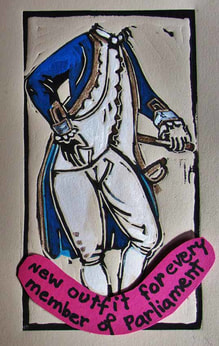 Cartoon by Natasha Williams-Novak
Cartoon by Natasha Williams-Novak IN THE past month, seven members of the Federal Parliament have been referred to the High Court after discovering that they hold, might have held or are entitled to hold dual citizenship, which has the potential to render their election to office invalid.
As the High Court begins its examination of who should be voted on or off the island, it is interesting to consider the issues in their broader context. The first question is whether dual citizenship or entitlement to dual citizenship necessarily means that allegiance is compromised. From a legal perspective maybe, but its practical application is pretty absurd.
The second question is, if we are to lower the requirements for our politicians, on what basis can we justify a higher standard of allegiance for Australia’s permanent residents?
Amid the hoo-ha and palaver plaguing our nation’s capital, proposed amendments to Australia’s citizenship laws are making their way through the Federal Parliament. The Minister for Immigration and Border Protection, Peter Dutton, has told us these amendments are necessary to preserve our national security and the integrity of Australian citizenship.
Under this new regime, permanent residents would be required to wait for at least four years before making an application. They would also be required to prove their commitment to Australia, including by passing a new English language test equivalent to that expected of university entrants – a test which many Australians who were born here would never be able to pass. As the 2016 Census tells us, these laws would apply to a vast number of new migrants to our country, many of whom happen to be brown.
The extent to which racism impacts depends on how the colour of your skin is assessed and graded by the dominant majority. “Black”, “white”’ and “brown” are not classifications that exist because of biology or scientific fact but because of social conditioning, history and political opinion entrenched over many decades. Skin colour is just a label to which we have attached our ideas about supremacy and inferiority. It also informs the global distribution of wealth and power.
Is it possible that there is a relationship between citizenship, skin colour and belonging in Australia? Are we prepared to accept the cultural heritage of some, but not others?
A few of us are First Australians – and the rest of us are from … well, just about everywhere. We are first generation, sixth generation, bi-cultural, bi-lingual and multi-lingual; some of us speak English, some of us do not. As Mikhaela Barlow pointed out last month in her courageous article Little white lies, in Bass Coast we are Bunurong, Boon Wurrung and, among other things, we also have a proud Italian heritage. Migration paths and current statistics show that 49 per cent of Australians were either born overseas themselves or one or both parents were. We also know that up to one quarter of Australians are dual citizens or entitled to become dual citizens.
Until now, however, we have acted as though we belong to a mono-culture and that it is this sameness that keeps us safe.
As these last few weeks in Canberra have demonstrated, we are not the same. Constitutional issues aside, this is an exciting time in Australia because the blinders are coming off.
So what is it that we are still not seeing?
In Canberra, our politicians know they have one job to do and that is to win or retain their seats; they understand the power of fear. They are well-versed in the business of anecdotal evidence and half-baked stories about law and order and border protection. Perhaps we should stop to consider that all this might not, in fact, have anything to do with “them” and everything to do with “us” because we have allowed our own sense of decency to become increasingly distorted.
Australia’s war is not with ISIS, Muslims, “boat people”, Asians or people smugglers. Australia’s war is against the mediocrity which has been polluting our minds, eroding our sense of fairness and ripping through the collective spirit like cancer.
In stark contrast to the dull and unimaginative minds that got us into this mess in the first place, it will take great minds of all colours to get us out of it.